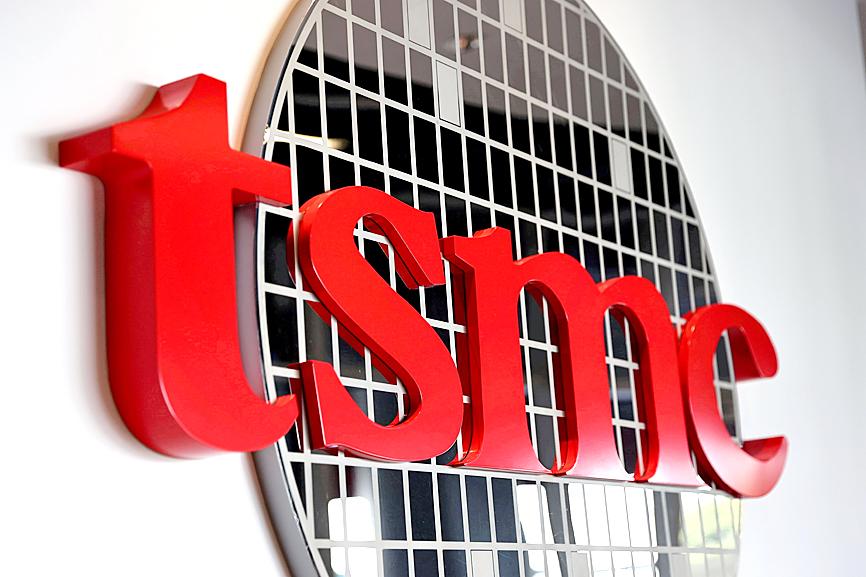Taiwan Semiconductor Manufacturing Co (TSMC, 台積電) and Sony Semiconductor Solutions Corp yesterday announced plans to set up a joint venture — Japan Advanced Semiconductor Manufacturing Inc (JASM) — to build a semiconductor fab in Japan’s Kumamoto Prefecture that would initially produce 22-nanometer and 28-nanometer chips.
TSMC’s board of directors yesterday approved a proposal for the company to invest up to US$2.12 billion that would give it a majority shareholding in the planned venture.
Sony Semiconductor, a wholly owned subsidiary of Sony Group Corp, is to invest US$500 million in JASM, giving it a less than 20 percent stake, it said in a joint statement with TSMC.

Photo: Ann Wang, Reuters
“The digital transformation of more and more aspects of human lives is creating incredible opportunities for our customers, and they rely on our specialty processes that bridge digital life and real life,” TSMC chief executive officer C.C. Wei (魏哲家) said in the joint statement.
“We are pleased to have the support of a leading player and our long-time customer, Sony, to supply the market with an all-new fab in Japan, and also are excited at the opportunity to bring more Japanese talent into TSMC’s global family,” Wei said.
Construction of JASM’s fab in Japan is scheduled to begin next year, with production expected to commence at the end of 2024, the statement said.
The fab is expected to create about 1,500 jobs and to have a monthly production capacity of 45,000 12-inch wafers, it said.
The initial capital expenditure is estimated to be about US$7 billion, with strong support from the Japanese government, it said.
“While the global semiconductor shortage is expected to be prolonged, we expect the partnership with TSMC to contribute to securing a stable supply of logic wafers, not only for us, but also for the overall industry,” Sony Semiconductor president and CEO Terushi Shimizu said.
“We believe that further strengthening and deepening our partnership with TSMC, which has the world’s leading semiconductor production technology, is extremely meaningful for the Sony Group,” Shimizu added.
Separately, TSMC’s board also approved a capital budget of US$9.04 billion to install and upgrade advanced technology capacity, and to build mature and specialty technology capacity, advanced packaging capacity, as well as new fab facilities, the company said in a separate statement.
According to TSMC, part of the budget will be used to build a production facility for 7-nanometer and 28-nanometer processes in Kaohsiung next year, with mass production expected to begin in 2024.
The statement said the budget also covers capitalized lease assets, as well as investment in research and development, and other capital expenditures for the first quarter of next year.
TSMC shares rose 1.5 percent to close at NT$611 in Taipei trading yesterday, as the stock received a boost from reports that US-based client Advanced Micro Devices Inc has won an order from Meta Platforms Inc (formerly known as Facebook Inc) to supply the Epyc processor for data centers.
“TSMC’s lead over its peers in high-end technologies has put it among the ‘metaverse concept’ stocks,” Mega International Investment Services Corp (兆豐國際投顧) analyst Alex Huang (黃國偉) said.
Additional reporting by CNA

Nvidia Corp chief executive officer Jensen Huang (黃仁勳) on Monday introduced the company’s latest supercomputer platform, featuring six new chips made by Taiwan Semiconductor Manufacturing Co (TSMC, 台積電), saying that it is now “in full production.” “If Vera Rubin is going to be in time for this year, it must be in production by now, and so, today I can tell you that Vera Rubin is in full production,” Huang said during his keynote speech at CES in Las Vegas. The rollout of six concurrent chips for Vera Rubin — the company’s next-generation artificial intelligence (AI) computing platform — marks a strategic

Enhanced tax credits that have helped reduce the cost of health insurance for the vast majority of US Affordable Care Act enrollees expired on Jan.1, cementing higher health costs for millions of Americans at the start of the new year. Democrats forced a 43-day US government shutdown over the issue. Moderate Republicans called for a solution to save their political aspirations this year. US President Donald Trump floated a way out, only to back off after conservative backlash. In the end, no one’s efforts were enough to save the subsidies before their expiration date. A US House of Representatives vote

Shares in Taiwan closed at a new high yesterday, the first trading day of the new year, as contract chipmaker Taiwan Semiconductor Manufacturing Co (TSMC, 台積電) continued to break records amid an artificial intelligence (AI) boom, dealers said. The TAIEX closed up 386.21 points, or 1.33 percent, at 29,349.81, with turnover totaling NT$648.844 billion (US$20.65 billion). “Judging from a stronger Taiwan dollar against the US dollar, I think foreign institutional investors returned from the holidays and brought funds into the local market,” Concord Securities Co (康和證券) analyst Kerry Huang (黃志祺) said. “Foreign investors just rebuilt their positions with TSMC as their top target,

REVENUE PERFORMANCE: Cloud and network products, and electronic components saw strong increases, while smart consumer electronics and computing products fell Hon Hai Precision Industry Co (鴻海精密) yesterday posted 26.51 percent quarterly growth in revenue for last quarter to NT$2.6 trillion (US$82.44 billion), the strongest on record for the period and above expectations, but the company forecast a slight revenue dip this quarter due to seasonal factors. On an annual basis, revenue last quarter grew 22.07 percent, the company said. Analysts on average estimated about NT$2.4 trillion increase. Hon Hai, which assembles servers for Nvidia Corp and iPhones for Apple Inc, is expanding its capacity in the US, adding artificial intelligence (AI) server production in Wisconsin and Texas, where it operates established campuses. This